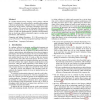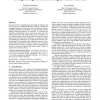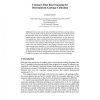17 search results - page 1 / 4 » Multicore garbage collection with local heaps |
IWMM
2011
Springer
13 years 7 days ago
2011
Springer
In a parallel, shared-memory, language with a garbage collected heap, it is desirable for each processor to perform minor garbage collections independently. Although obvious, it i...
IWMM
2010
Springer
14 years 2 months ago
2010
Springer
The pervasiveness of multiprocessor and multicore hardware and the rising level of available parallelism are radically changing the computing landscape. Can software deal with tom...
IWMM
2011
Springer
13 years 7 days ago
2011
Springer
To achieve optimal performance, garbage-collected applications must balance the sizes of their heaps dynamically. Sizing the heap too small can reduce throughput by increasing the...
SCAM
2005
IEEE
14 years 2 months ago
2005
IEEE
Long-running, heavily multi-threaded, Java server applications make stringent demands of garbage collector (GC) performance. Synchronisation of all application threads before garb...
CC
2001
Springer
14 years 1 months ago
2001
Springer
Root scanning is the task of identifying references to heap objects that are stored outside of the heap itself, in global and local variables and on the execution stack. Root scann...



